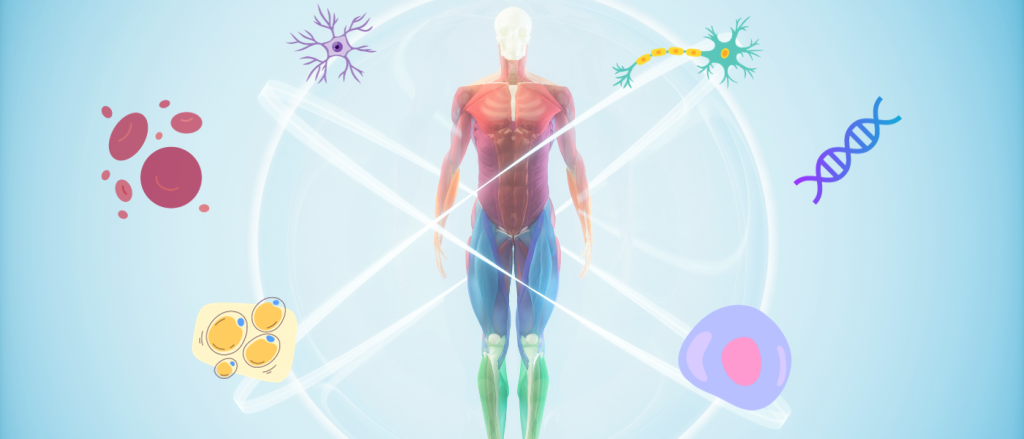The Cellular Superhero You Never Knew About
Edison de Mello, MD, PhD & Gina Galvez, MS, PA
What the heck is it? Does it work? Is it Right for you?
Most people have probably never heard of Phosphatidylcholine, let alone pronounce it (fŏs′fə-tīd′l-kō′lēn′) or if you break it down – Phos-phatidyl-choline.
A naturally occurring chemical in eggs, red meat, nuts, and whole grains, Phosphatidylcholine (PC) is a phospholipid that makes a crucial neurotransmitter called acetylcholine; it plays an essential role in memory, movement, metabolism – and reducing fatty liver (fat deposits in the liver).
Acetylcholine is converted into choline, a water-soluble macronutrient related to folate and vitamin B complex that humans must consume through their diet to remain healthy. Like its precursor acetylcholine, choline is also essential for cognition, memory, and higher energy levels – and it has been used medically for improving memory and neurological conditions such as Alzheimer’s disease ( 1,2)
Together, phosphatidylcholine and choline are essential for biological membranes, replacing damaged cell membranes and restoring their structure and function. They also play a significant role in the autonomic nervous system, regulating heart rate, blood vessel dilation, bodily secretions, and more. (1,3).
Several researchers believe Phosphatidylcholine acts like a detergent and breaks down fat. A particular form of Phosphatidylcholine (polyunsaturated Phosphatidylcholine) is believed to protect against liver fibrosis and further damage caused by excessive alcohol consumption.
Benefits, Uses, Forms & Side Effects
1. Phosphadylcholine IN A DETOX.
Due to its ability to repair and protect liver cells, PC can benefit detoxification programs as a building block of liver cell membranes, which are highly susceptible to damage from alcohol, medications, pollutants, viruses, and other toxins. (1,3) Phopdadylcholine supplementation optimizes the building block of these cell membranes while also breaking down fat deposits.
Although more clinical double-blind studies are needed to verify the many benefits of Phosphatidylcholine for the conditions listed below, existing studies paint an optimistic picture of it.
Inflammation
Treatment with Phosphatidylcholine decreased inflammation and white blood cell reaction related to arthritis. Dietary Phosphatidylcholine improved rheumatoid arthritis symptoms in mice by reducing inflammation. Another study on mice decreased inflammatory white blood cell levels and inflammation.
Improved Metabolic Health
Phosphatidylserine (PE) and Phosphatidylcholine are the most abundant phospholipids that regulate lipids, lipoproteins, and whole-body energy metabolism. Low levels of PC in tissues can influence energy metabolism and have been linked to disease progression.
Low PC and PE levels are associated with metabolic disorders, including atherosclerosis, insulin resistance, and obesity.
Healthy Memory
An animal study published in the Journal of Nutrition examined the effects of PC administration in mice with dementia and low acetylcholine concentration; researchers found that administration of PC improved memory and generally increased brain choline and acetylcholine levels to or above the levels of the control normal mice. In a study published in Neurobiology of Aging, researchers found that PC levels were significantly lower in patients with Alzheimer’s, adding evidence that it plays a vital role in the disease’s pathology.
Ulcerative Colitis
Phosphatidylcholine may help protect the large intestine wall and relieve symptoms of ulcerative colitis, an inflammatory bowel disease. Research indicates that ulcerative colitis patients have decreased PC content, and adding PC to the colonic mucus helps alleviate inflammatory activity.
In studies consisting of 316 patients with ulcerative colitis, Phosphatidylcholine (PC) supplementation reduced disease severity, improved quality of life, and induced remissions.[2,5] It also decreased dependence on corticosteroids and resulted in complete therapy withdrawal in some patients.
NSAID-Induced Stomach Ulcers
Studies have demonstrated that Phosphatidylcholine can protect the stomach from injuries caused by nonsteroidal anti-inflammatory drugs (NSAIDs).
Liver Damage & Non-alcoholic fatty liver disease (NAFLD)
PC provides liver detoxification support in several ways. Both human and animal research have shown that PC reduces hepatic inflammation and the damage caused by lower liver enzymes, which can lead to liver damage. Because PC likely reduces fat deposits, it has been shown to lower hepatic lipid levels in mice fed a high-fat diet. This supports the idea that dietary PC may help fight non-alcoholic fatty liver disease, but more human studies are needed to confirm this potential phosphatidylcholine benefit. [6,7]
Australia, for example, has over six million people affected by liver disease, including the increasingly common NAFLD (non-alcoholic fatty liver disease, (5] PC can provide medical practitioners with a practical addition to complement their current liver and detoxification protocols.
Phosphatidylcholine (PC) increases the production of the gamma receptors responsible for the breakdown of fats. According to preliminary evidence, they may also help with lipomas, benign tumors caused by fat buildup. However, the researchers emphasized the need for further well-designed studies.
Interestingly, Australian researchers have combined PC with silybin, an active Silybum marianum (milk thistle) constituent, finding the combination improved liver enzymes, liver histology, and insulin resistance while protecting gastric and liver cells from oxidative stress.[7].
Nerve Protection
Inflammation can decrease the production of new neurons in the hippocampus, a brain region important for learning and memory. Studies have shown that Phosphatidylcholine prevented this decrease.
Gallstones
In one study on mice, researchers observed dietary Phosphatidylcholine’s ability to prevent gallbladder formation.
Other potential benefits
- Anxiety.
- Eczema.
- Gallbladder disease.
- Manic-depressive illness.
- Circulation disorders of the arms and legs.
- Weight loss.
- Premenstrual syndrome (PMS).
- Depressed immunity.
- Healthy aging.
How to Use it.
Phosphatidylcholine is given in several forms:
- Intravenous: PC can be administered intravenously (IV) by a trained professional, which goes directly into the bloodstream for the highest potency.
- Orally: Phosphatidylcholine supplements are available in capsule and tablet forms. There’s no standard recommended dose, but it appears safe to take up to 30 grams daily for six weeks or up to six grams daily for two years. A commonly recommended dose is 840 milligrams up to twice daily.
- Injection: Phosphatidylcholine injections can be given under the skin by a trained professional. Doses should be spread apart by two to four weeks.
- Topical: PC is applied to the skin to reduce inflammation, acne, and more. It’s available in serum, ointment, and oil forms.
- Naturally: You can get PC naturally from food sources, such as red meat, eggs, nuts, seeds, and whole grains, which is the best way to maintain healthy levels.
Risks and Side Effects.
Phosphatidylcholine (PC), a crucial chemical in our cells, is LIKELY SAFE when used under the supervision of a licensed health care provider. Studies have shown that correcting low levels may improve various biological actions, including memory, liver, and gut health, but larger, double-blind studies are still needed. PC is also a crucial component of the colon’s mucosal layer and acts as a surfactant within the mucus to create a hydrophobic surface to prevent bacterial penetrance.
Although relatively rare, PC supplements may cause upset stomach, diarrhea, or excessive sweating. Injection side effects may include irritation, redness, burning, pain, and itchiness at the injection site.
PC supplements should not be taken with an AChE inhibitor unless done under a doctor’s care. Taking the supplement and medication together may cause muscle weakness, trouble breathing, reduced heart rate, and seizures.
PC should NOT be taken with Alzheimer’s disease medications unless recommended by a health care provider. And, although rare, if Phosphatidylcholine is injected directly into a fatty growth (lipoma), it might cause an inflammatory reaction that could make the tumor more fibrous.
Phosphatidylcholine Side Effects (rare) & Precautions
- sweating.
- Stomach upset.
- Diarrhea.
- nausea.
- vomiting
- irritation.
- swelling
- redness
- itching
- burning
- bruising
- pain
- dizziness
Food Sources (partial list)
- beef liver (248 mg/100g)
- eggs (238 mg/100g)
- chicken liver (214 mg/100g)
- beef (69 mg/100g)
- soybeans (66 mg/100g)
- shrimp (58 mg/100g)
- salmon (48 mg/100g)
- peanut butter (35 mg/100g)
Dosage.
The FDA has not approved PC supplements for medical use. Regulatory bodies generally must ensure supplements’ quality, safety, and efficacy. Speak with your doctor before supplementing your diet with it.
Phosphatidylcholine can be administered in capsules, tablets, and injections. If your licensed healthcare practitioners suggest using a PC, follow the recommended regimen suggested. Clinical studies have used oral phosphatidylcholine doses, ranging from 0.5-4 g per day for up to 12 weeks. Research has recommended a minimum daily dose of 800mg to improve liver function and enhance recovery. (1,3).
Interactions
Drying medications (Anticholinergic drugs)
Drying medications called anticholinergic drugs should NOT be taken with Phosphatidylcholine because it might increase or decrease the effects of these drying medications. Examples of the anticholinergic drugs that are contraindicated with the use of PC are atropine, scopolamine, antihistamines, and Tricyclic antidepressants, such as amitriptyline, nortriptyline (Pamelor), and clomipramine (Anafranil).
Medications for Alzheimer’s disease (Acetylcholinesterase (AChE) inhibitors).
Medications for Alzheimer’s called acetylcholinesterase are also contraindicated because they increase acetylcholine. Taking phosphatidylcholine along with medications for Alzheimer’s disease might increase the effects and side effects of medications for Alzheimer’s disease. Some medications called acetylcholinesterase inhibitors include donepezil (Aricept), tacrine (Cognex), rivastigmine (Exelon), and galantamine (Reminyl, Razadyne).
IMPORTANT: DO NOT use Phosphatidylcholine if you’re using any of these medications or any class of Acetylcholinesterase (AChE) inhibitors), unless approved by a neurologist. In general, given the potential for an advert drug interaction or side effect, the use of phosphatidylcholine MUST supervised by a licensed and well-trained health care practitioner.
Take home message.
- Phosphatidylcholine is a phospholipid in foods like eggs and whole grains. It’s used to make an important neurotransmitter that plays a role in memory.
- PC benefits include improving memory, reducing fat deposits, relieving ulcerative colitis symptoms, and supporting metabolic health.
- The chemical can be taken in supplement form, injected under the skin by a trained professional, or used topically. It does interact with some medications, so speak to your doctor before using it therapeutically.
- Phosphatidylcholine is also used for treating hepatitis, eczema, gallbladder disease, circulation problems, high cholesterol, and premenstrual syndrome (PMS), improving the effectiveness of kidney dialysis, boosting the immune system, and preventing aging.
- Healthcare providers sometimes give phosphatidylcholine intravenously (by IV) for chest pain, fat globules in the blood (fat embolism), high cholesterol, liver disease, and fatty plaque deposits in arteries.
- Phosphatidylcholine is injected under the skin (subcutaneously) for treating non-cancerous fatty tumors (lipomas), excess fat around the eyelids, and yellowish cholesterol deposits just under the surface of the skin (xanthelasmas).
- Apart from its role in maintaining cell structure, phosphatidylcholine [2, 1, 3, 4)
- It builds a mixture of fats and proteins lining our lungs, enabling us to breathe.
- It is one of the main components of mucus that lines and protects our gut.
- It shields the nerves by increasing choline and acetylcholine levels in the brain,
- protects the liver,
- It helps break down fats.
- According to research, Phosphatidylcholine levels may decrease as we age; for example, there is a 10% reduction after age 40 (2, 1). Low levels of phosphatidylcholine in the brain may be associated with Alzheimer’s disease [11, 12]. On the other hand, high levels of docosahexaenoic acid (the fatty acid attached to low levels of phosphatidylcholine in the liver are associated with fatty liver.
References:
1. Federico A, Dallio M, Di Fabio G, et al. The silybin-phosphatidylcholine complex protects human gastric and liver cells from oxidative stress. In Vivo 2015;29(5):569-575. [Full text]
2. Gastroenterological Society of Australia. The economic cost and health burden of liver disease in Australia, 2013. Viewed 1 Nov 2016. [Link]
3. Olthof MR, Brink EJ, Katan MB, et al. Choline supplemented as phosphatidylcholine decreases fasting and post-methionine-loading plasma homocysteine concentrations in healthy men. Am J Clin Nutr 2005;82(1):111-117. [Full text]
4. Lee HS, Nam Y, Chung YH, et al. Beneficial effects of phosphatidylcholine on high-fat diet-induced obesity, hyperlipidemia, and fatty liver in mice. Life Sci 2014;118(1):7-14. [Abstract]
5…Zamroziewicz MK, Zwilling CE, Barbey AK. The inferior prefrontal cortex mediates the relationship between phosphatidylcholine and executive functions in healthy, older adults. Front Aging Neurosci 2016; 8:226. [Full text]
6.. Zeisel SH, Mar MH, Howe JC, et al. Concentrations of choline-containing compounds and betaine in common foods. J Nutr 2003;133(5):1302-1307. [Full text)
7. Kidd P. Phosphatidylcholine: a superior protectant against liver damage. Altern Med Rev 1996;1(4):258-274. [Full text]
8. Phosphatidylcholine monograph. Natural Medicines, 2015. Viewed 27 Oct 2016. [Link]



















